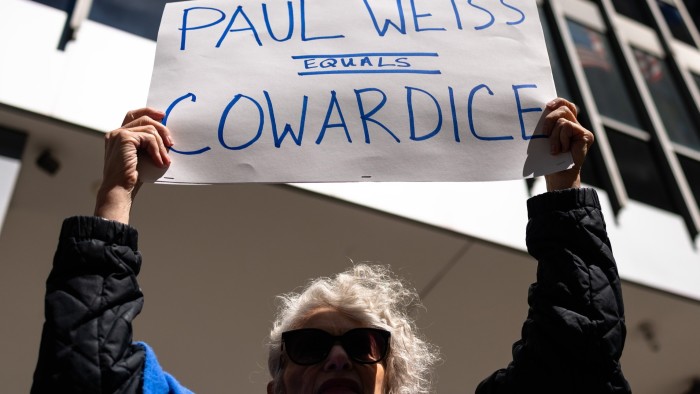One scoop to start: US venture capital giant Andreessen Horowitz is in talks to invest in social media platform TikTok as part of an effort led by US President Donald Trump to wrest control of the popular video app from its Chinese owners.
And a new billionaire: Christopher Ruddy, a rightwing media mogul and longtime friend of Trump, has become a multibillionaire — at least on paper — after Newsmax shares continued to surge following its public listing debut on Monday, an unlikely outcome for a lossmaking cable television channel.
Welcome to Due Diligence, your briefing on dealmaking, private equity and corporate finance. This article is an on-site version of the newsletter. Premium subscribers can sign up here to get the newsletter delivered every Tuesday to Friday. Standard subscribers can upgrade to Premium here, or explore all FT newsletters. Get in touch with us anytime: Due.Diligence@ft.com
In today’s newsletter:
-
Law firms bend the knee to Trump
-
Johnson & Johnson’s failed “Texas two-step”
-
Klarna’s BNPL backlash
The Maga reckoning for Big Law
In a matter of weeks, Donald Trump has successfully brought Big Law to its knees.
Since February, he has doled out executive orders and threats against some of the country’s most powerful law firms, triggering existential and identity crises across the legal sector.
In today’s Big Read, we spell out how and why Paul Weiss — one of the most prestigious firms out there — swiftly came to the table to negotiate at the Oval Office instead of putting up a fight like some of its peers.
Although Paul Weiss was the first elite law firm to buckle to an executive order, several leaders from rival firms told the FT privately that they would cut similar deals if targeted with one.
There were a handful of reasons the law firm cut a deal. Dealmaking has become a bigger part of Paul Weiss’s business in recent years, and fighting the order would raise the risk that clients and top rainmakers would flee.
With a select group of partners now making eight-figure salaries at the biggest law firms, they’ll happily jump ship for the highest bidder.
A critical figure here is Brad Karp. He’s a longtime Democratic supporter who would’ve been a frontrunner for US attorney-general if Kamala Harris had won the 2024 presidential election and has been chair of the firm since 2008.
Karp was the one to hash out the deal with Trump two weeks ago. Ultimately, he told colleagues he had a “fiduciary duty” to save the firm — its very survival was threatened by Trump’s order.
Meanwhile, others have decided to put up a fight. Perkins Coie, Jenner & Block and WilmerHale are all fighting back with lawsuits, and judges have already frozen parts of all three of the executive orders against them.
Yet others have quietly followed behind Paul Weiss. Skadden, another top corporate law firm, reached an agreement with Trump to provide $100mn worth of pro bono services preemptively — before he had even targeted it with an order.
On Tuesday, Willkie Farr & Gallagher, which recently hired Doug Emhoff, Harris’s husband, signed a similarly sized deal with the president.
The next big development the legal world will be watching this week is the amicus brief to back Perkins’ case. DD’s Sujeet Indap broke the news at the weekend that none of the 20 top law firms had agreed to unconditionally support the brief.
Longer term, some are sceptical the settlements will be a panacea for firms like Paul Weiss while Trump remains in office.
J&J goes back to square one
The third time was definitely not the charm for Johnson & Johnson.
Late on Monday, the US bankruptcy court in Houston dismissed the bankruptcy case of Red River Talc, the latest in a trio of J&J affiliates that housed billions in potential talc liabilities.
It’s the most recent entity to try and fail to use the US Chapter 11 system to solve its talc problem once and for all.
You might remember that the debut method was the notorious so-called Texas two-step that an appeals court struck down a few years back.
The rub is that J&J wants the benefits of bankruptcy without the $400bn company filing for bankruptcy itself, DD’s Sujeet Indap explains.
To say the least, courts have been sceptical of the strategy. Though in this latest attempt, the court faulted how the company whipped votes it needed for a 75 per cent support threshold among victims.
For its part, J&J said it had never believed its powder was dangerous. The company vowed to fight and win in the regular mass tort trials across the country where it said that it had basically a perfect record of winning talc liability cases so far.
J&J has never been shy about taking shots at the trial lawyers that could make a fortune from the cases. And the aftermath of the Houston decision didn’t prove to be an exception.
“The plaintiffs’ bar had their opportunity to accept an unprecedented resolution,” said a J&J lawyer on a Tuesday investor call.
“Instead, they squandered the moment, believing that we could be coerced into settling for egregiously large amounts outside of the bankruptcy system. They were and are sorely mistaken.”
J&J lost more than 7 per cent of its market cap on Tuesday, or about $30bn. The Texas judge who dismissed the case had other thoughts beyond dollars and cents.
Judge Christopher López was blunt about what the outcome meant for plaintiffs: alleged victims “may unfortunately continue to die while all of this gets sorted out”, he said.
Online backlash over BNPL loans rocks Klarna
“Buy now, pay later” is everywhere these days. Shopping for everything from food to fast-fashion now comes with the option to “pay in four” — free of interest.
Klarna — whose bold pink icon specks the checkout pages of Asos, Apple, Samsung and Sephora — popularised the product. And two decades after its founding, the Swedish fintech is gearing up to go public.
While Klarna has been eager to show off its prowess ahead of its New York IPO, it hasn’t all been smooth sailing. Over the past few weeks, it’s inked a pair of deals that have raised some eyebrows.
Last month, the fintech appeared to outdo its rival, Affirm, when it announced a partnership with American retail giant Walmart, promising $500mn in stock in exchange for a chance to lend to shoppers.
Affirm’s shares at first took a significant hit, but soon recovered after the Silicon Valley company put out a statement confirming it was still working with Walmart.
Dan Dolev, an analyst at Mizuho, described Klarna’s Walmart deal as a “publicity stunt” designed to rev up interest in the IPO.
The next deal made an even bigger splash.
Klarna announced it would bring its BNPL loans to food delivery company DoorDash, provoking a backlash online as social media posters compared taking on debt to pay for food deliveries to the subprime loans that caused the last financial crisis.
The criticism didn’t arrive at a great time for the company’s IPO, for which it is targeting a $15bn valuation.
Meanwhile, in the background the bigger cloud hanging over Klarna’s prospects are concerns about today’s economic environment and the durability of its loanbook.
But the real judge of the staying power of Klarna’s business will ultimately be its stock market debut. Nothing’s better than the real-time reaction of shareholders to gauge a company’s durability.
Job moves
-
Newsmax added Alex Acosta, the former labour secretary during Trump’s first term, to its board of directors in March.
-
Azura Partners has appointed Frédéric Genta as chair and regional head of Europe. He previously worked for the government of Monaco, and before that at Google and Amazon.
-
Davis Polk has hired Ryan McNaughton as a partner for the firm’s finance practice in New York. He joins from Cadwalader, Wickersham & Taft, where he specialised in structured and asset-based finance.
Smart reads
M&A blow-up The collapse of the merger of US grocers Kroger and Albertsons shows the risks when deals go wrong, the FT’s Sujeet Indap writes.
$WLFI The first family was able to take control of crypto venture World Liberty Financial, which had raised more than $500mn, Reuters reports. And they were also able to grab most of those funds.
Posh babysitters A wave of super-rich newcomers to Palm Beach has bumped up demand for six-figure nannies and housekeepers, the New Yorker writes.
News round-up
US labour watchdog halts Apple cases after Trump picks group’s lawyer for top job (FT)
Carmakers fined over €550mn for European recycling cartel (FT)
FCA says UK Court of Appeal car finance ruling went ‘too far’ (FT)
Lutnick fields rival US Steel bids by Nippon Steel, activist (Bloomberg)
easyJet founder takes aim at Premier Inn over ‘Rest easy’ branding (FT)
Apple and Google app stores host VPNs linked to sanctions-hit Chinese group (FT)
Lloyd’s of London chair backs internal CEO replacement (FT)
DeepMind slows down research releases to keep competitive edge in AI race (FT)
Metro ex-CEO claims watchdog ‘too busy’ to supervise before £900mn error (FT)
Due Diligence is written by Arash Massoudi, Ivan Levingston, Ortenca Aliaj, and Robert Smith in London, James Fontanella-Khan, Sujeet Indap, Eric Platt, Antoine Gara, Amelia Pollard and Maria Heeter in New York, Kaye Wiggins in Hong Kong, George Hammond and Tabby Kinder in San Francisco. Please send feedback to due.diligence@ft.com
Recommended newsletters for you
Source link









